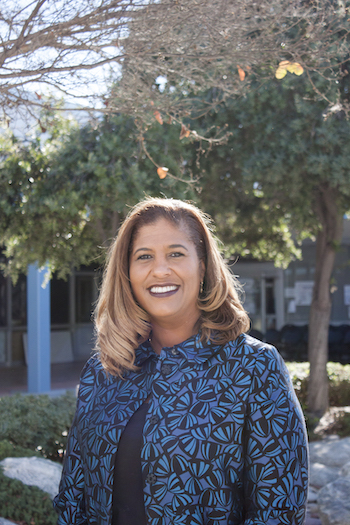Vice President of Student Services Dr. Dilcie Perez Chosen for National Presidential Fellowship for Community College Leaders
40 Aspiring Community College Presidents Will Participate in 2020-21 Aspen Rising Presidents Fellowship to Advance Student Success
FOR IMMEDIATE RELEASE: May 4, 2020
Media Contact: Cerritos College - Miya Walker, Public Affairs
Aspen Institute - Monica Clark
 NORWALK, Calif. - May 4, 2020 - The Aspen Institute College Excellence Program today announced that Dr. Dilcie Perez,
Vice President of Student Services at Cerritos College, is one of 40 leaders selected
for the 2020-21 class of the Aspen Rising Presidents Fellowship, a highly selected leadership program preparing the next generation of community
college presidents to transform institutions to achieve higher and more equitable
levels of student success.
NORWALK, Calif. - May 4, 2020 - The Aspen Institute College Excellence Program today announced that Dr. Dilcie Perez,
Vice President of Student Services at Cerritos College, is one of 40 leaders selected
for the 2020-21 class of the Aspen Rising Presidents Fellowship, a highly selected leadership program preparing the next generation of community
college presidents to transform institutions to achieve higher and more equitable
levels of student success.
The Rising Presidents Fellows will embark on a 10-month fellowship beginning in July 2020. Delivered in collaboration with the Stanford Educational Leadership Initiative, the fellows will be mentored by esteemed current and former community college presidents who have achieved exceptional outcomes for students throughout their careers, and will learn strategies to improve student outcomes in and after college, lead internal change, and create strong external partnerships with K-12 schools, four-year colleges, employers, and other partners.
“Evidence shows that substantial improvements in student success are achieved only when presidents have the commitment and skill needed to lead change within their institutions and through partnerships in the community,” said Josh Wyner, executive director of the College Excellence Program. “These fellows have been chosen because they embody that commitment and, we believe, will build their skills even further to become transformational presidents.”
“Dr. Perez has a strong passion and an unwavering commitment to serving students. Her ability stay hyper-focused on delivering excellent service to students, her warm and approachable leadership style, and strategic outlook on big picture matters are exactly the abilities a future president needs to be transformational. I have no doubt that Dr. Perez will make an excellent contribution to Aspen fellowship and in the future she will make an amazing CEO,” Dr. Jose Fierro, President/Superintendent, Cerritos College.
The Aspen Rising Presidents Fellowship responds to the growing need for a new generation of leaders well-equipped to meet the challenges of the future. Nationally, nearly 80 percent of sitting presidents plan to retire in the next decade. While the traditional pathway to the presidency has excluded women and people of color, the incoming class of Aspen Rising Presidents Fellows is composed of 70 percent women and 61 percent people of color and represents institutions of varying sizes and locations.
Together, the 2020-21 fellows are leaders at colleges that collectively serve more than 500,000 students. As well, 42 Rising Presidents Fellowship alumni have become presidents of community colleges that collectively serve an additional 500,000 students nationwide.
2020-21 Aspen Rising Presidents Fellows
Margaret Annunziata, Davidson County Community College (NC)
Gita Bangera, Bellevue College (WA)
Kaylyn Bondy, Williston State College (ND)
Naima Brown, Santa Fe College (FL)
Monica Brown, Montgomery College (MD)
DeAnna Burt, South Central College (MN)
Monica Castaneda, Glendale Community College (AZ)
Tamara Clunis, Amarillo College (TX)
Mildred Coyne, Broward College (FL)
Renee Craig-Marius, Reedley College (CA)
Mark Curtis-Chávez, College of DuPage (IL)
Chrissy Davis, Spokane Falls Community College (WA)
Tawny Dotson, Clover Park Technical College (WA)
Kurt Ewen, Houston Community College (TX)
Mary Gutierrez, Diablo Valley College (CA)
Susan Guzman-Trevino, Temple College (TX)
Paul Hernandez, Mount Wachusett Community College (MA)
Lloyd Holmes, Monroe Community College (NY)
Jennifer Kent, Ranger College (TX)
Kimberly Lowry, Lone Star College – Houston North (TX)
Ali Mageehon, Southwestern Oregon Community College (OR)
Corey McCray, Tidewater Community College (VA)
Donna McDaniel, Texarkana College (TX)
Brian Merritt, Central Carolina Community College (NC)
Scott Newman, Oklahoma State University Institute of Technology (OK)
Mayra Olivares-Urueta, Tarrant County College (TX)
Tammi Oyadomari-Chun, University of Hawaii (HI)
Julie Penley, El Paso Community College (TX)
Dilcie Perez, Cerritos College (CA)
Nicole Reaves, Northern Virginia Community College (VA)
Star Rivera Lacey, San Diego Continuing Education (CA)
Irene Robles-Lopez, Pima Community College (AZ)
Vince Rodriguez, Coastline Community College (CA)
Kate Smith, Rio Salado Community College (AZ)
Jackie Thomas, Lone Star College-Tomball (TX)
Lena Tran, San Jose City College (CA)
Joel Welch, Western Piedmont Community College (NC)
Kristina Whalen, Las Positas College (CA)
Jermaine Whirl, Greenville Technical College (SC)
Jonathan Woodward, Mississippi Gulf Coast Community College (MS)
-END-

Stay Connected